Study your vocabulary? There’s an app for that!
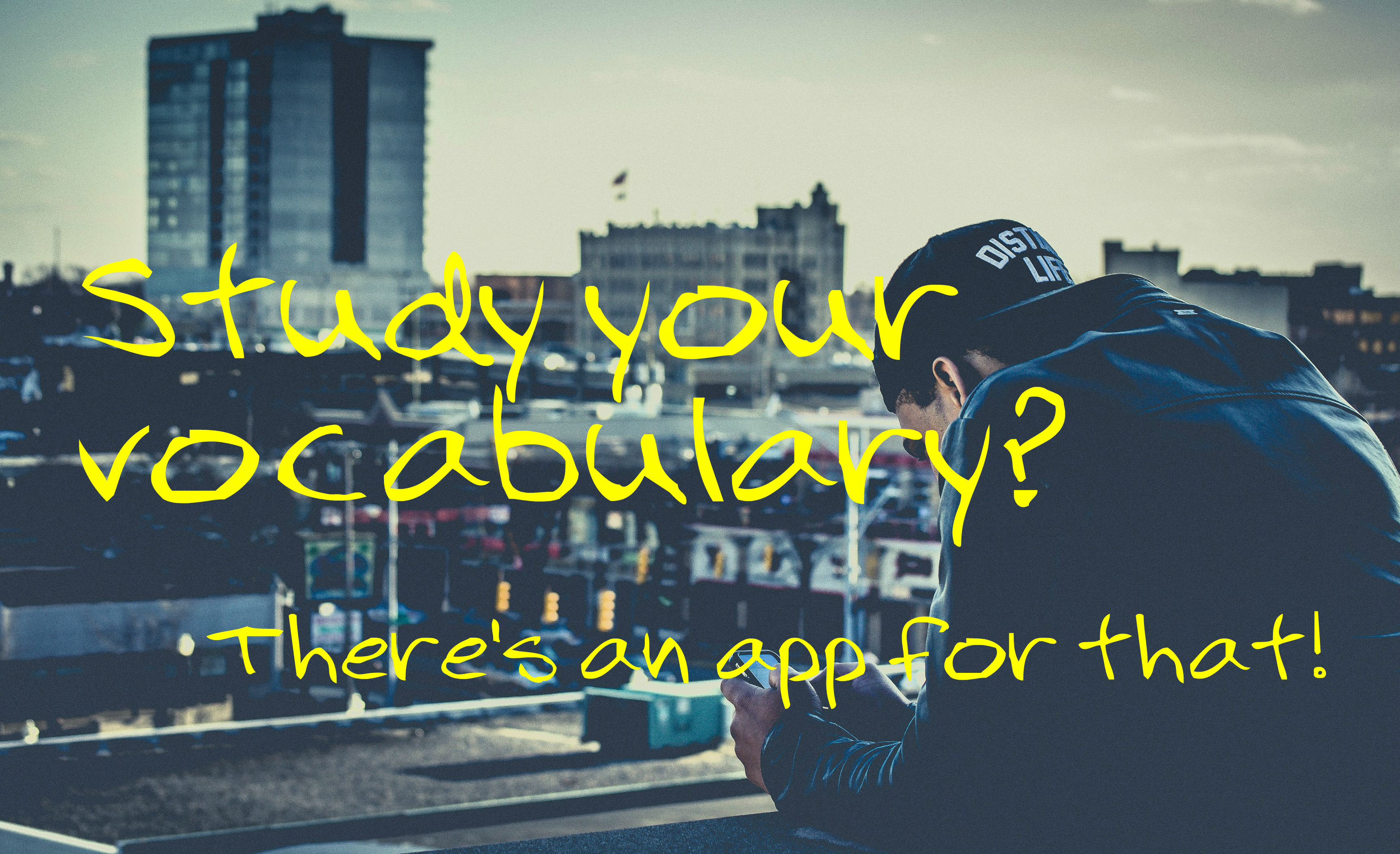
Quizlet is a wonderful Internet site for helping students study and learn (and English teachers to teach!). It’s particularly great when you want to memorize vocabulary words. You can create your own set of “flashcards” and review them, listen to the words in English, even take a test on them.
But some students don’t own computers or can’t use them conveniently. So what if you could study your vocabulary words on your phone?
Now you can … by installing the Quizlet app on your phone. Here’s how it works.
Find the app at your app store. It’s free! Yes, you can pay for a “premium” edition, but the free app is just fine for most students.
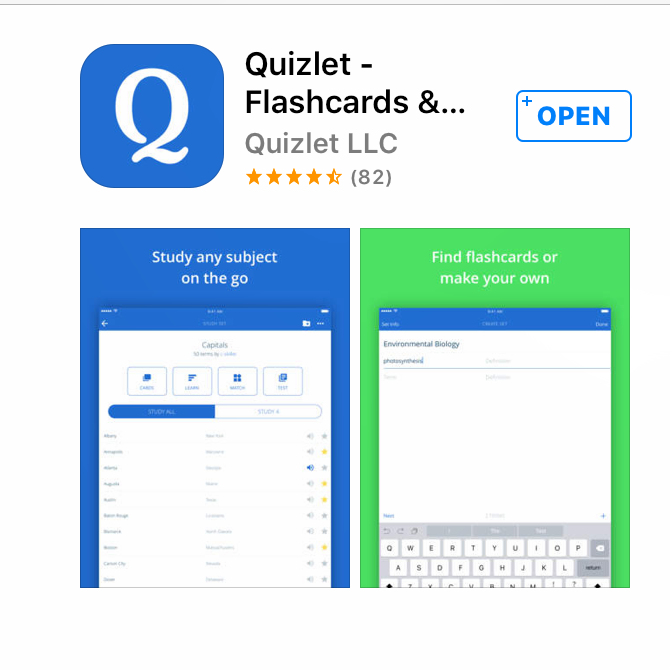
If this is your first time using Quizlet, you’ll need to sign up. After that, you can just log in.

To sign up, you can use your Google or Facebook account, or you can provide a little information about yourself. I don’t think there’s any risk to giving Quizlet this information. I have been a member for years and I’ve never gotten any spam.
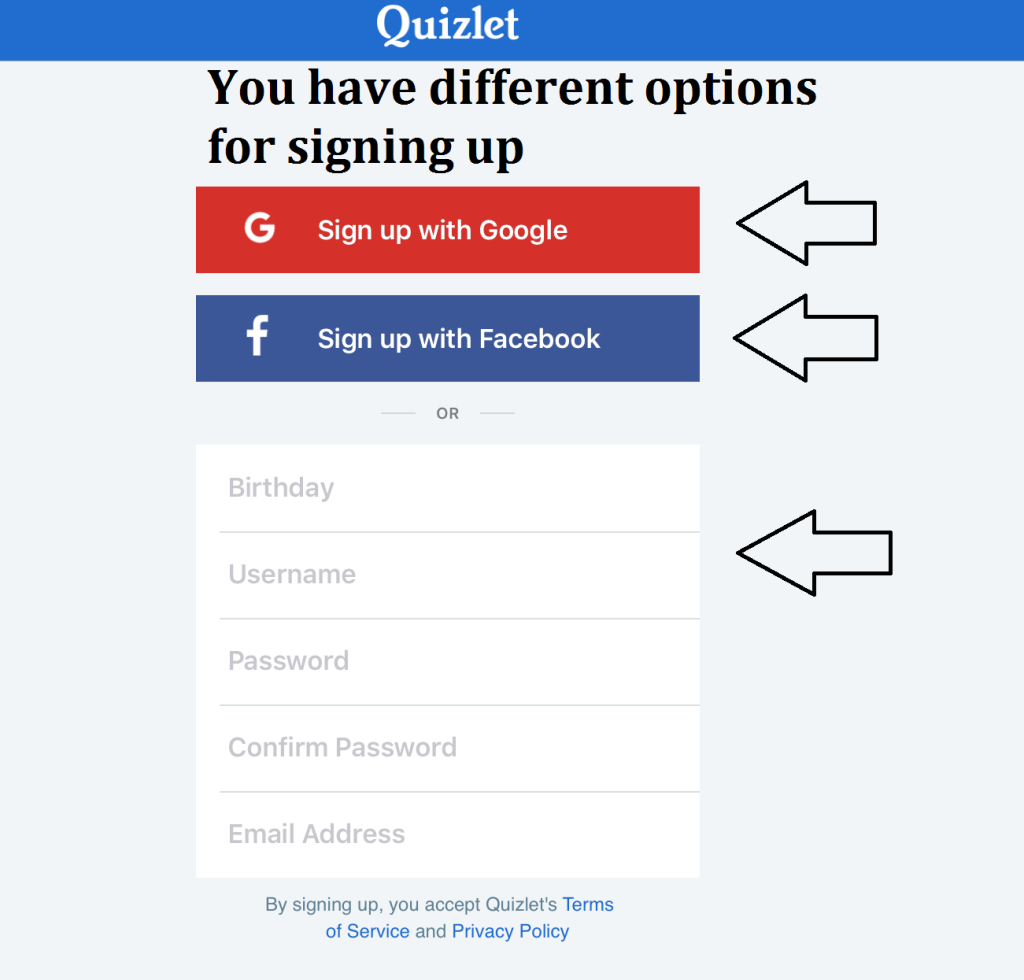
This is what my home page looks like. You can see all the study sets I’ve created, both as a teacher and as a student (of French). To create your first study set, click on the bar at the top that says, “Create a new study set.”
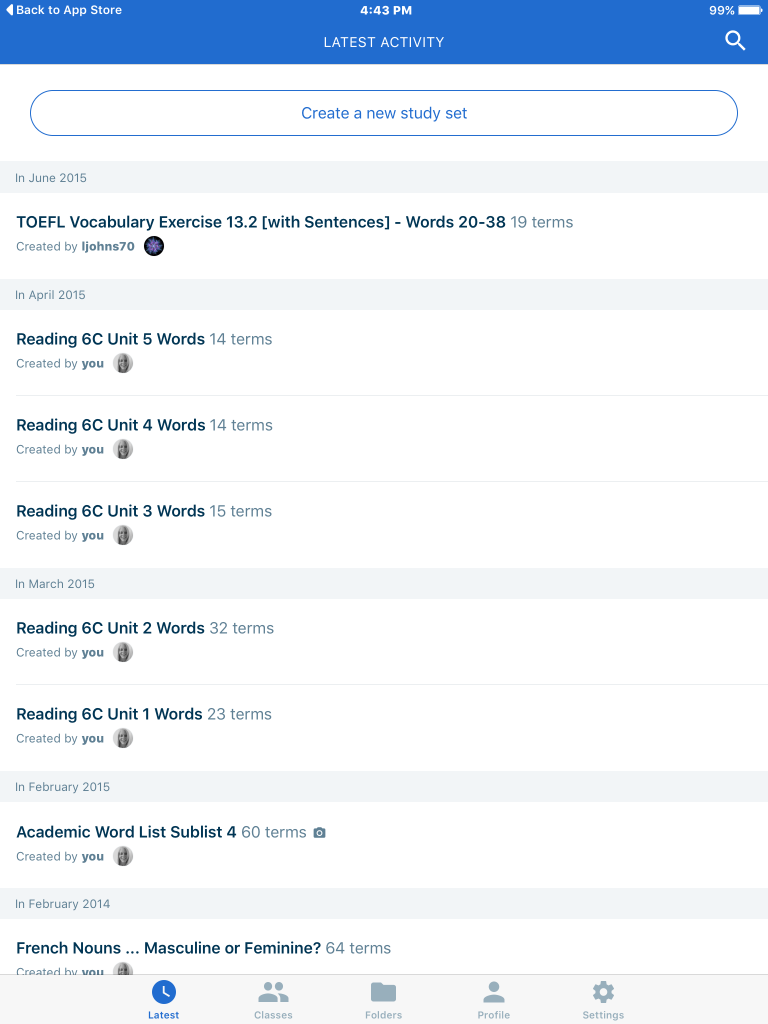
If you are using Quizlet to study vocabulary, you should set English as the language for the terms. Those are the words you want to learn. For the definitions (the meanings) of the words, you can choose your own language. You can also permit other people (maybe your friends or classmates) to see your study sets.

I created a very simple set of English/French words to show you what it looks like. Your title should help you to easily identify your study set. Remember that soon, I hope, you will have lots of sets visible on your home page. You need to be able to tell them apart. To add new words to your set, click on the “plus” sign at the bottom right. And when you are finished your set, click on “Done” at the top right.
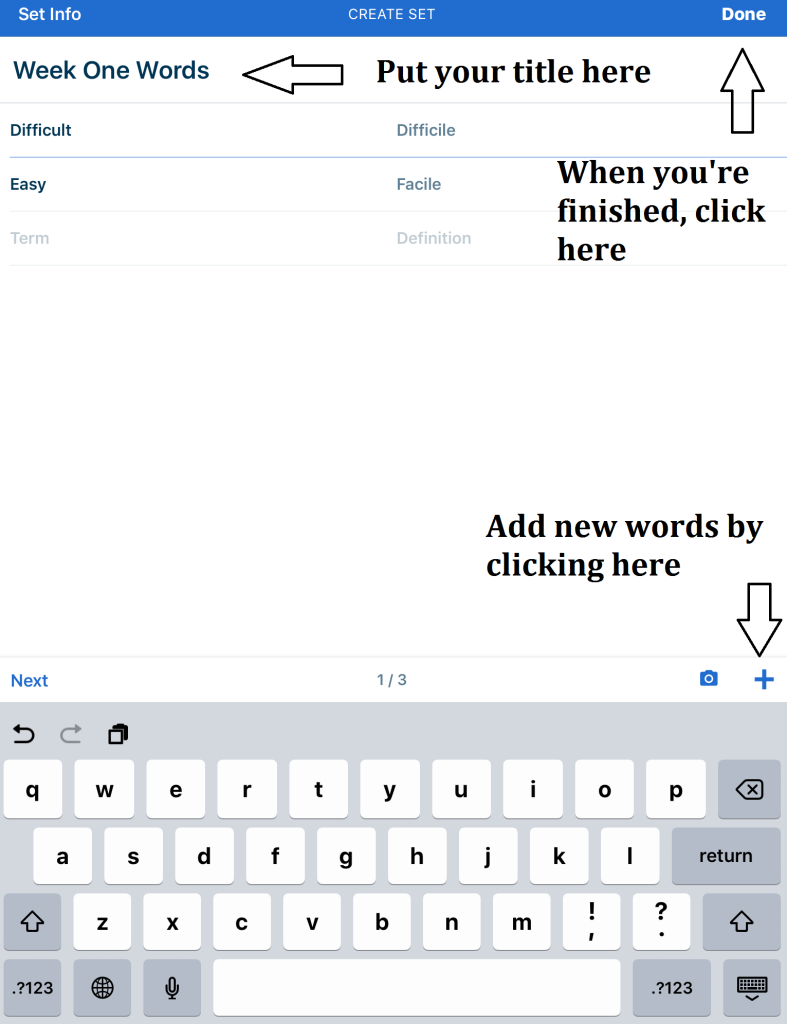
Once your set is done, it will look like this.
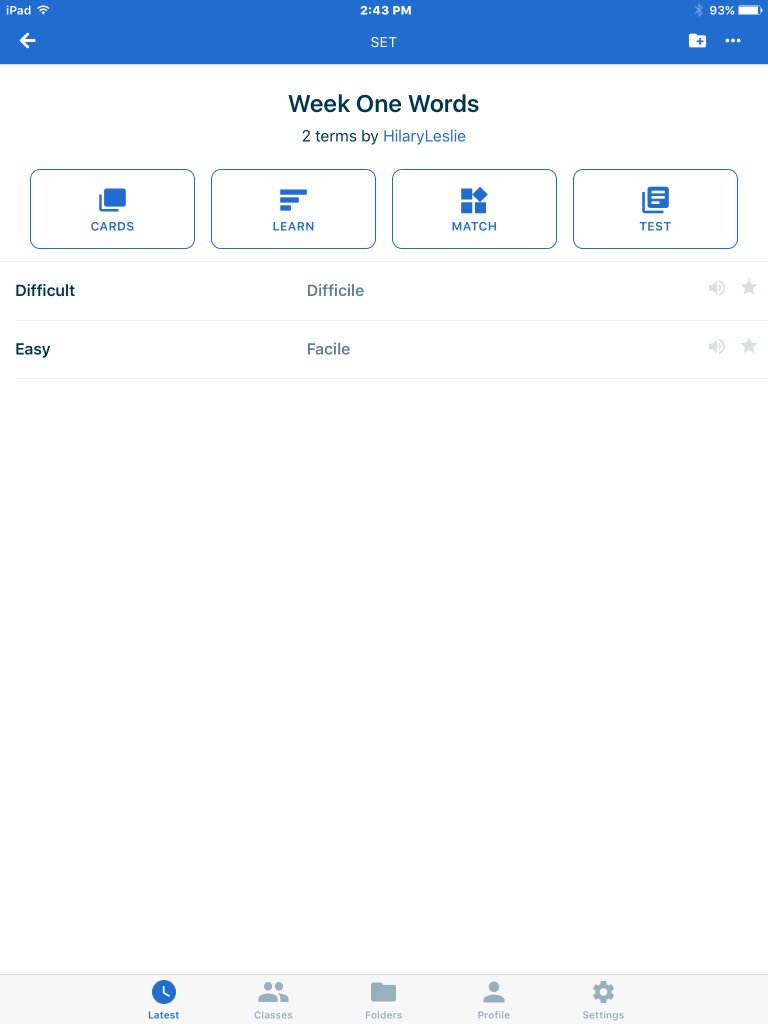
The Cards option gives you your “flashcards.” You see the word in English and you can even hear it by clicking on the microphone icon on the top right of the card. When you touch the card, it will flip over to show you the definition in your language.
In the Learn option, you have to type the meaning of the word, in English, while you look at the definition in your language.
The Match option allows you to play a matching game with all the words and their definitions.
Finally, the Test option provides three types of tests: written, multiple choice, and true/false. You can choose whether to see the term or definition first, to hear the words (tap on “play audio”), and to get “instant feedback.”
With Quizlet, you can study vocabulary virtually anywhere … on the bus, in the park, at the beach, even in the bathroom. Memorizing vocabulary words is generally not the most fun part of learning a language, but Quizlet makes it a whole lot easier and a lot less painful!
I have an accent!

Do you speak English with an accent? Do you wish you didn’t have an accent? Are you ashamed of your accent?
The truth is that unless you started speaking English when you were very young, or unless you have a very unusual gift for languages, you will probably have an accent.
And that’s okay!
Actually, most of us Americans love to hear someone speaking with an accent. If you have been to the U.S., you will notice that we all have accents too. Someone from New Jersey, where I was born, does not sound much like someone from Kentucky, where I live now. We all speak English, but our accents and even the words we use depend on where we grew up. It’s probably the same in your country.
Since you can’t get rid of your accent, what should you aim for in your spoken English?
The most important thing is that other people understand you. If you speak to someone in English, and they look puzzled or ask you to repeat what you said, you probably need a little improvement. Usually your grammar does not have to be very good for you to be understood. But you may have to work on your pronunciation, your intonation, and your pace.
Problems with pronunciation usually arise from your first language (what we teachers call your L1). Native Chinese speakers have different pronunciation problems than native Arabic speakers, or native French speakers. Some sounds are just harder for people to say (or even to hear!) than other sounds. I think the best way to fix pronunciation problems is to work with a native English speaker. You don’t have to be face-to-face. Make use of new technology to connect with people. Ask them to listen to you carefully and to correct your mispronunciation. Keep practicing!
Intonation is another problem. This means that your voice naturally rises and falls. Intonation patterns can really vary from one language group to another. If you don’t try to copy English intonation patterns, you may have trouble being understood. A great way to improve intonation is to listen to English language TV shows or movies. Pretend you are one of the actors and speak their lines.
Finally, there’s pace, which means how fast or slow you talk. Maybe you have been studying English in a classroom or with recorded materials. But when you watch an American movie, people seem to be speaking a different language, and much more quickly! Unless you are really, really good at English, I think it’s better to slow down when you speak. If you have problems with pronunciation and/or intonation, speaking quickly is only going to make it harder for people to understand you. Even in a test like TOEFL, when you only have a minute to answer a question, slow down. TOEFL is looking for speech that is “clear, fluid, and sustained.” You don’t need to speak rapidly, and if you do, you may not be understood.
When you are speaking to someone in English, they may repeat some of your words or phrases. This does not mean that they are correcting you. It’s what we do naturally when we want to make sure we have understood something. Remember that the goal of learning a language is to communicate. With or without an accent, if your English is good enough so that you can be understood, you should be very pleased with your fluency.
Listen or hear?
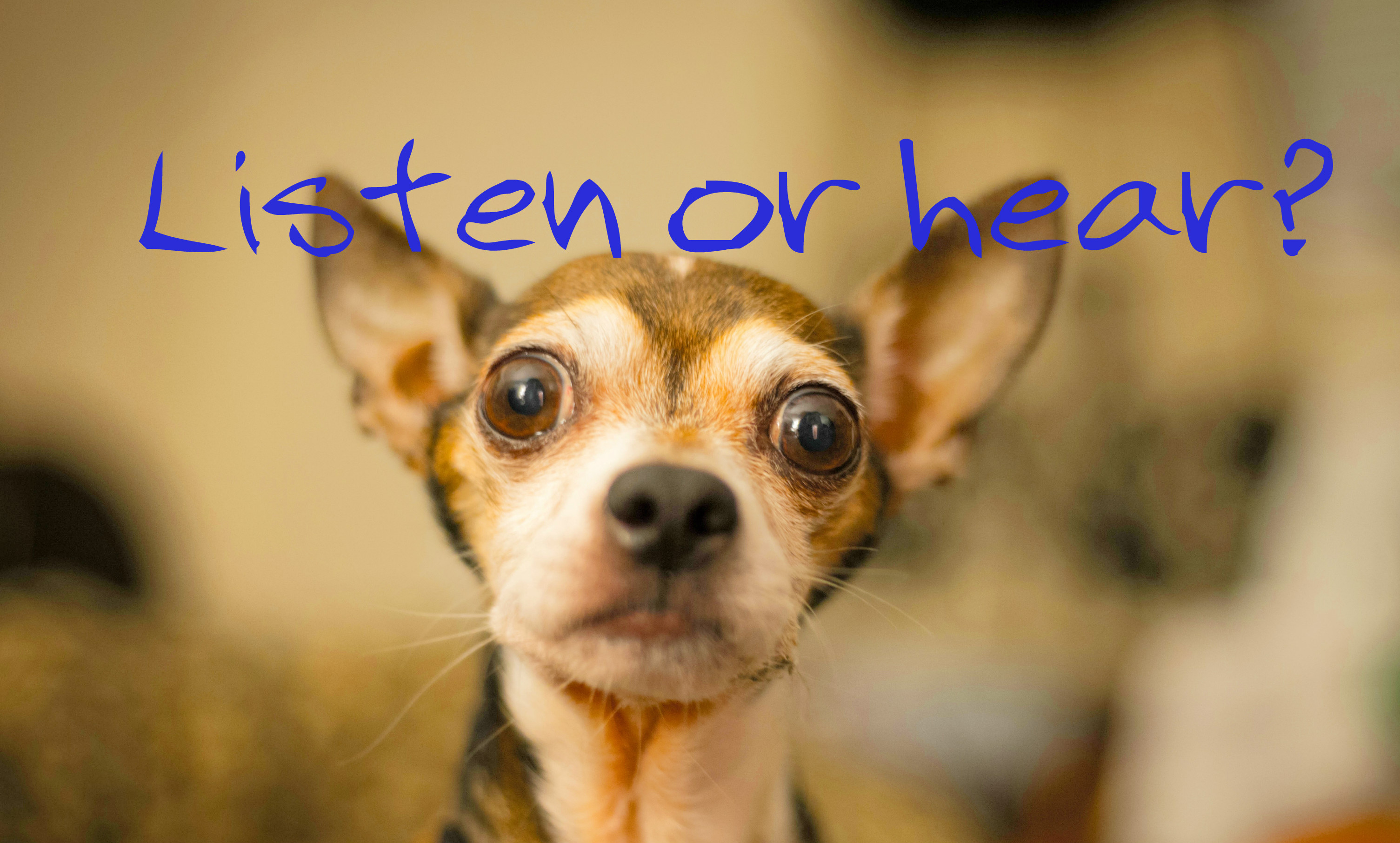
The verbs to listen and to hear can also be confusing to English learners. Much like to look and to see, these words focus on one of our physical senses. To listen and to hear both concern what we do with our ears.
Let me give an example. Today my husband was reading an article in the newspaper. I was trying to tell him about my plans for Easter. I asked him if he had heard me, and he nodded his head. I said:
I know you can hear me, but are you listening to me?
To hear involves your ears, just as to look involves your eyes. It has a physical meaning. Sit quietly. What do you hear? I hear my fingers on the keyboard. I hear my computer humming. I hear some men working outside. I hear my dog breathing loudly. I hear the clock ticking. I hear a car driving down the street.
But I’m not listening to these sounds. My mind is on something else. I’m thinking about what I’m writing. My ears are hearing things, but I’m not paying attention to them. We hear sounds around us all the time, but we don’t really notice them.
To listen means using your ears, but also paying attention to what you hear. For example, when I walk, I listen to music. When I have lunch with a friend, I listen to what she says. When I wake up early, I listen to the birds outside. When we listen, we not only hear but we also pay attention.
Some common English expressions using these verbs are:
Listen to this! (When you want someone to listen to you, especially when you read something out loud)
Please listen to reason! (When the person you are talking to is thinking of doing something unwise)
I hear you! (I understand and agree with what you just said)
Hear me out! (Listen to what I say before you give me your opinion)
Have you heard from ….? (Has this person contacted you?)
Hard of hearing (Someone can’t hear well; they are somewhat deaf)
Finally, note that when you have a direct object (a person or thing), to hear is not followed by a preposition. You hear something. I hear him talking. I hear music. I don’t hear any birds. However, when there is a direct object, to listen is always followed by a preposition, usually to. You listen to someone or something. I am listening to him. I am listening to music. I’m not listening to you, because I’m mad at you. If you listen for something, it means you expect to hear something. I am listening for the doorbell, because my friend is going to come any minute.
To practice these words, make two short lists. First, right now, what do you hear? Second, what do you enjoy listening to?
Look or see?

Two words that are commonly confused in English are look and see.
To see usually implies a more strictly physical way of using your eyes. For example, you use glasses or contact lenses so you can see better. When you go to the eye doctor, he or she asks if you can see certain letters. You look in a mirror and you see your reflection. Some common expressions that use see include:
See you later! (It’s very likely that you will be meeting your friend in the near future.)
See you around! (This is more vague; maybe you will run into your friend at some point.)
I see! (You understand something.)
We’ll see. (Often used by parents to put off making a decision. Child: Mom, can we get a dog? Mom: We’ll see.)
I’m seeing a doctor about my problem. I need to see a doctor about this problem.
I’m seeing someone. (Usually this means that you are in a relationship with someone else.)
To look usually implies a more focused way of using your eyes. Here’s an example:
I see some birds outside. (They are there, and I see them, but I am not really interested in them.)
My cat is looking at some birds. (They are there, my cat sees them, and she is very interested in them.)
Notice that to see is most often used in a simple rather than progressive tense, while to look is often used in a progressive tense. For example:
I see some birds over here. Yesterday, I saw some birds over there.
My cat is looking at the birds. Yesterday, she was looking at them for hours.
The verb to look is often followed by a preposition that changes its meaning. These sentences contain phrasal verbs with look:
Can you look at my website and tell me what you think?
I need to look over my notes before I give my speech.
Look out! You almost got hit by that car!
I need to look up that word in a dictionary.
Our boss looks down on the employees and doesn’t treat them very well.
I’m getting fat. I need to look into joining a gym.
I’m going to look around for a good deal before I buy a car.
She’s always looking for a good deal.
My grandmother looked after me when I was little.
You need to look ahead and plan for your future.
I’m looking forward to seeing that movie.
Another way that English speakers use these verbs is as an exclamation or interjection. For example:
See, I told you he wouldn’t do a good job!
Look, how many times do I have to ask you to take out the garbage?
In these cases, look and see are virtually interchangeable. They are used to draw your listener’s attention to what you are saying.
Finally, what about the verb to watch? Watching also involves your eyes, but now you are using them not just physically and attentively, but for a longer period of time. For example, you watch a movie or a TV show. People who are interested in birds are called “birdwatchers.” Some people like to go to a mall or park and “people watch.” In the 1960s, there was even a rock group that sang a song, I’m a Girl Watcher. Sometimes, watch and look are used in almost the same way. For example, if someone is in danger, you might call out, “Watch out!” or “Look out!”
How can you learn the difference between these words? Watch movies in English. Look at English websites on your computer. See how many times you can find these words in use.
What do you think?

When someone asks you to give your opinion, what should you say, and how should you say it?
In tests like the TOEFL iBT, or in your English classroom, you may be asked what you think about some topic. A common question is whether you agree or disagree with something. For example, do you agree or disagree that children should start school when they are three years old?
First of all, be sure to start your response confidently, using proper English.
Some people begin with phrases like Personally speaking (which sounds a bit unnatural) or, even worse, According to me (which native English speakers never say!). Try In my opinion or From my point of view instead. But really, you don’t need these “filler” phrases. Especially in tests like the TOEFL, you don’t have much time to express your opinion, so don’t waste it on empty words.
Try to use good grammar. Don’t say, I am agree (or I am disagree). Instead, say, I agree or I disagree (or I don’t agree). If you want to add some emphasis, use words like strongly or definitely. For example, I strongly disagree that children should start school when they are three years old. Or, I definitely agree that children should start school when they are three years old. Other popular word choices (which are sometimes overused) are totally, completely, and absolutely. Never use greatly or exactly.
What if you don’t completely agree or totally disagree with something? What if you see two sides to the issue? There are some common English expressions that can help you express this point of view. And, actually, using phrases like these can make you sound much more fluent.
For example:
I both agree and disagree with this statement (point of view, opinion).
I think this issue is not black and white. (Or, I don’t think this matter is black and white.)
I believe it’s important to strike a balance.
I really think there’s a happy medium.
Perhaps it’s best to find some middle ground.
It depends.
Or, the popular duo, On the one hand …. on the other hand.
Of course, after you state your main belief, you will usually be expected to offer one or more reasons to support it. The number of reasons you need and the amount of elaboration you give will depend on the amount of time you are given to speak. In a test like the TOEFL, when you have only 45 seconds, it’s not necessary or even desirable to provide more than one reason. Instead of struggling to come up with two or more reasons, focus on developing your one reason with specific details and examples. You can start out your sentences with phrases like:
I think that …
I believe that …
It seems to me that …
In my experience, I have found that …
So, here are some examples of responses you might make to the question about children’s schooling.
I agree (one extended reason):
I definitely agree that children should start school when they are three years old. In my country, most women go back to work after having a baby. They take about three years off after the baby and then they have to return to their job. So, in my country, most children go to schools at that time. If there are schools for children that age, then the parents know that their children are in a safe place, with trained people to take care of them. Of course, when they are only three, children don’t have to sit at desks and do school assignments, but they can play with other children and learn social skills. They can learn the alphabet and how to count, and they’ll also learn valuable lessons about obeying the teacher and respecting other people. So I think if children start school at age three, it’s definitely better for the parents, because their children are taken care of, and it’s also better for the kids themselves, because they’ll be learning lots of things.
I agree (two reasons):
I strongly agree that children should start school when they are three years old. First of all, in my country, most mothers and fathers work full-time, so it’s good for children to have a place to go where they can be with responsible adults and play with other children. For example, I started school when I was very young and my parents felt I was safe and cared for there. Also, I think that in today’s world, it’s important for children to get an education as soon as possible. In countries where children don’t go to school until they are six or seven, I don’t think they get enough education. I learned to read before I was five years old and I think that was a real advantage for me. This is why I think school is good for children, even when they are only three years old.
I disagree (two reasons):
I strongly disagree that children should start school when they are three years old. First of all, I think children are safer and more loved when they are living in their own home. For example, my sister’s child went to school when she was very young and she was always getting sick. Also, she didn’t see her mother and father as much, and I think that had a bad effect on her. Also, I think that children learn lots of things at home; they don’t need school when they are that young. For example, my mother taught me numbers and letters while I was very young. But I also had a chance to play with my brothers and sisters and not to feel pressured to start learning. This is why I think it is better for children to go to school when they are older, maybe at age five or six.
I can see both sides of the issue:
I think whether children start school when they are three years old depends on the situation. On the one hand, if both of the parents work, then I think it’s probably a good idea for children to be in school, rather than home with someone who might not take good care of them. In school, they can be with other children and they can start learning things at a young age. On the other hand, if a mother or father stays home with their child, then I think it’s good for children to go to school later on. Nobody loves their child as much as a parent, so I think it is good for children to be with their parent. Also, they can be with their brothers and sisters, which makes their relationships stronger. So I don’t think it’s a black and white issue. Sometimes it’s better for children to go to school when they are very young, and sometimes it’s better that they stay home longer.
You can find more discussion about discussing your “mixed feelings” here.
